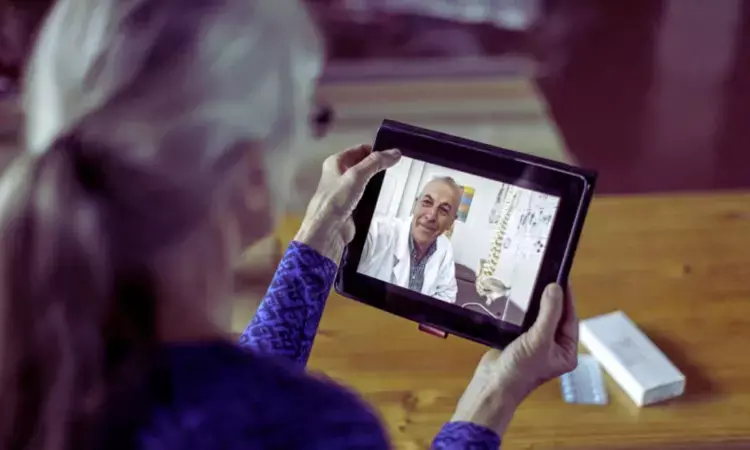- Home
- Medical news & Guidelines
- Anesthesiology
- Cardiology and CTVS
- Critical Care
- Dentistry
- Dermatology
- Diabetes and Endocrinology
- ENT
- Gastroenterology
- Medicine
- Nephrology
- Neurology
- Obstretics-Gynaecology
- Oncology
- Ophthalmology
- Orthopaedics
- Pediatrics-Neonatology
- Psychiatry
- Pulmonology
- Radiology
- Surgery
- Urology
- Laboratory Medicine
- Diet
- Nursing
- Paramedical
- Physiotherapy
- Health news
- Fact Check
- Bone Health Fact Check
- Brain Health Fact Check
- Cancer Related Fact Check
- Child Care Fact Check
- Dental and oral health fact check
- Diabetes and metabolic health fact check
- Diet and Nutrition Fact Check
- Eye and ENT Care Fact Check
- Fitness fact check
- Gut health fact check
- Heart health fact check
- Kidney health fact check
- Medical education fact check
- Men's health fact check
- Respiratory fact check
- Skin and hair care fact check
- Vaccine and Immunization fact check
- Women's health fact check
- AYUSH
- State News
- Andaman and Nicobar Islands
- Andhra Pradesh
- Arunachal Pradesh
- Assam
- Bihar
- Chandigarh
- Chattisgarh
- Dadra and Nagar Haveli
- Daman and Diu
- Delhi
- Goa
- Gujarat
- Haryana
- Himachal Pradesh
- Jammu & Kashmir
- Jharkhand
- Karnataka
- Kerala
- Ladakh
- Lakshadweep
- Madhya Pradesh
- Maharashtra
- Manipur
- Meghalaya
- Mizoram
- Nagaland
- Odisha
- Puducherry
- Punjab
- Rajasthan
- Sikkim
- Tamil Nadu
- Telangana
- Tripura
- Uttar Pradesh
- Uttrakhand
- West Bengal
- Medical Education
- Industry
Telehealth Mindfulness-Based Interventions Prove Effective for Veterans with Chronic Pain: The LAMP Trial

USA: In a recent study, the LAMP Randomized Clinical Trial has demonstrated that scalable, low-resource mindfulness-based interventions (MBIs) delivered via telehealth can significantly benefit veterans suffering from chronic pain. The multisite trial explored the effectiveness of these virtual MBIs in improving pain-related function and biopsychosocial outcomes, particularly among those with high levels of psychiatric comorbidity.
In their study, published in JAMA Internal Medicine, the researchers reported that both group-based and self-paced MBIs enhanced pain-related function and biopsychosocial outcomes in veterans with chronic pain and significant psychiatric comorbidities. Specifically, the probability of achieving a 30% improvement from baseline was higher for group MBIs at ten weeks and six months, while self-paced MBIs showed greater improvements at ten weeks, six months, and one year.
Chronic pain is a pervasive issue among veterans, often compounded by psychological distress and limited access to traditional therapeutic resources. While mindfulness-based interventions are proven treatments for chronic pain and related conditions, scaling their implementation presents significant challenges, including the need for dedicated space and trained instructors. Considering this, Diana J. Burgess, University of Minnesota Medical School, Minneapolis, and colleagues aimed to examine group and self-paced, scalable, telehealth MBIs for veterans with chronic pain compared to usual care.
For this purpose, the researchers conducted a randomized clinical trial from November 2020 to May 2022 with veterans suffering from moderate to severe chronic pain across three Veterans Affairs facilities. They compared two 8-week telehealth MBIs with usual care. The interventions included a group MBI, delivered via videoconference with prerecorded mindfulness education, skill training videos, facilitated discussions by an experienced instructor, and a self-paced MBI, which was completed asynchronously and supplemented by three individual facilitator calls. Follow-up was completed in August 2023.
The primary outcome measured was pain-related function, assessed using the Brief Pain Inventory interference scale at 10 weeks, 6 months, and 1 year. Secondary outcomes examined included pain intensity, physical function, anxiety, fatigue, sleep disturbance, participation in social roles and activities, depression, patient ratings of pain improvement, and posttraumatic stress disorder.
The study led to the following findings:
- Among 811 veterans randomized (mean age, 54.6 years; 47.7% women), 85.6% of participants completed the trial.
- Averaged across all 3-time points, pain interference scores were significantly lower for both MBIs than usual care (group MBI versus control difference: −0.4; self-paced versus control difference: −0.7).
- Both MBI arms had significantly better scores on the following secondary outcomes: pain intensity, patient global impression of change, physical function, fatigue, sleep disturbance, social roles and activities, depression, and posttraumatic stress disorder.
- Both group and self-paced MBIs did not significantly differ from one another.
- The probability of 30% improvement from baseline compared to control was greater for group MBI at ten weeks and six months, and for self-paced MBI at all three time points.
In the randomized clinical trial, scalable telehealth mindfulness-based interventions enhanced pain-related function and biopsychosocial outcomes more effectively than usual care for veterans with chronic pain.
"These low-resource telehealth-based MBIs could significantly expedite and improve the integration of nonpharmacological pain treatments into healthcare systems," the researchers concluded.
Reference:
Burgess DJ, Calvert C, Hagel Campbell EM, et al. Telehealth Mindfulness-Based Interventions for Chronic Pain: The LAMP Randomized Clinical Trial. JAMA Intern Med. Published online August 19, 2024. doi:10.1001/jamainternmed.2024.3940
Dr Kamal Kant Kohli-MBBS, DTCD- a chest specialist with more than 30 years of practice and a flair for writing clinical articles, Dr Kamal Kant Kohli joined Medical Dialogues as a Chief Editor of Medical News. Besides writing articles, as an editor, he proofreads and verifies all the medical content published on Medical Dialogues including those coming from journals, studies,medical conferences,guidelines etc. Email: drkohli@medicaldialogues.in. Contact no. 011-43720751


